How to Keep Kitchen Sponges From Smelling?
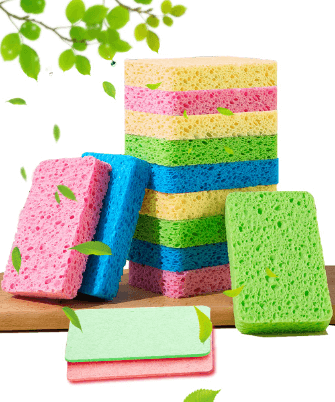
Sponges are one of the most versatile tools in the kitchen, but they can also be one of the most significant sources of bad smells. If your sponges start to smell, it can be challenging to eliminate the odor. Are you getting tense about how to keep kitchen sponges from smelling? Don’t panic; you can keep your sponges from smelling in the first place by doing a few things.
One way to keep your sponges from smelling is to make sure you’re using them correctly. Sponges should be used to scrub dishes and surfaces, not to clean up spills or clean messes. When you use a sponge for scrubbing, it’s important to rinse it well afterward so that food particles and dirt don’t have a chance to build up on the sponge.
Easy ways to keep your kitchen sponges from smelling:
You should squeeze out as much water as possible before storing the sponge, so it doesn’t have a chance to grow mold or mildew.
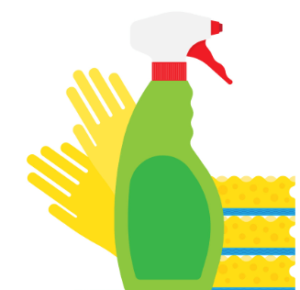
Another way to keep your sponges from smelling is to store them properly. Sponges should be stored in a dry place where they can get plenty of air circulation.
It’s also a good idea to store them in a container with holes so that any moisture can escape and the sponges don’t have a chance to grow mold or mildew.
Methods of avoiding smelly kitchen sponges are as follows:
If your sponges start to smell bad, there are a few things you can do to try and freshen them up. First, you can soak them in vinegar for about an hour.
This will help kill any bacteria that may be causing the bad odor. You can also try soaking them in baking soda overnight, which will help absorb any odors from the sponge.
- Rinse the sponge after each use and squeeze out any excess water.

- Store the sponge in an open, well-ventilated area to allow it to air out between uses.
- Disinfect the sponge regularly by boiling it in water for 5 minutes or microwaving it for 2 minutes (be sure to wet the sponge first, so it doesn’t catch fire).
- Replace your kitchen sponge every 1-2 weeks or sooner if it starts to smell bad.
How Do You Get the Smell Out of a Kitchen Sponge?
If your kitchen sponge smells terrible, there are a few things you can do to get the smell out. First, try soaking the sponge in vinegar for a few hours. If that doesn’t work, try boiling the sponge for a few minutes.
If neither of those methods works, you may need to replace the sponge.
Why Does My Kitchen Sponge Smell?
You’re not alone if you’ve ever noticed that your kitchen sponge has an unpleasant smell. This is a pretty common issue. There are a few different reasons why your sponge might start to smell bad.
One possibility is that you’re simply not cleaning it often enough. Your sponge is constantly being exposed to dirt, grease, and food particles, so it’s important to give it a good scrubbing on a regular basis. If you let the gunk build up too much, it will start to stink.
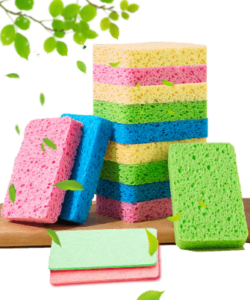
Another possibility is that you’re using the wrong kind of soap to clean your sponge. Some soaps can actually leave behind residue that contributes to the problem. Stick with plain old dish soap or vinegar and water instead.
Finally, it could be that your sponge is just old and needs to be replaced. Sponges only have a limited lifespan before they start falling apart and developing all sorts of funky smells. If yours is starting to smell bad no matter how often you clean it, it’s time for a new one!
Causes for a Kitchen Sponge to Have a Bad Smell:
- Mold, mildew, and bacteria
Although mold and mildew are other frequent offenders, bacteria is the primary cause of a smelly kitchen sponge. These microbes enjoy moisture, and a damp sponge offers them enough of it along with warmth and food to enable them to flourish. They give off scents and can make you feel unwell if you breathe them in or consume them.
- O?ils & Food Components
Smelly sponges can be caused by decaying food particles and oils. The same is true for drying towels, dish rags, and other items. If you discover that you frequently replace your sponges on a weekly basis because they become greasy, smelly, and dirty from strong-flavored food, you might want to reconsider how you wash your dishes.
How Do I Keep Bacteria off My Kitchen Sponge?
It’s easy to forget that our kitchen sponges are teeming with bacteria. In fact, studies have shown that kitchen sponges can harbor more bacteria than toilet seats! Gross!
So how do we keep these bacteria at bay and make sure our sponges are clean? Check a few tips to keep kitchen sponges bacteria-free: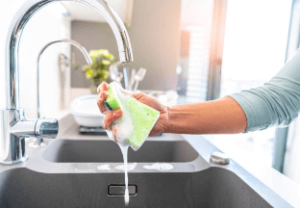
- Don’t use your sponge on raw meat or poultry.
You don’t want to contaminate your sponge with these foods’ potentially dangerous microorganisms to your dishes).
2. Rinse your sponge thoroughly after each use.
This will help remove any food particles or grease that might be providing a breeding ground for bacteria.
3. Disinfect your sponge regularly.
Pour 4 part water with 1 part vinegar together to make a disinfectant solution. Then soak your kitchen sponges in the solution for 4-5 minutes. However, you can also buy special “sponge sanitizers” that will do the job for you.
4. Replace your sponge frequently. A good rule of thumb is to get rid of it and start fresh every 2-3 weeks. You can keep your kitchen sponges bacteria-free and clean as well by following these tips.
Dishwash to Keep Kitchen Sponges Odor-free:
When your sponge smells nasty, you can also wash it in the dishwasher. place it in the dishwasher for the duration of the cycle along with your dirty dishes, securing it in the top shelf to ensure that it stays place while being cleaned, rinsed, and dried with heat.
Furthermore, the water needs to be hot enough. The bacteria hiding in your sponge will be destroyed by water that is 140 degrees Fahrenheit or above. To ensure you always have a clean sponge on hand, keep several sponges in the kitchen and alternate taking them in and out of the dishwasher.
Sanitizing Kitchen Sponge in the Microwave (Smelly sponge microwave):
To eliminate over 99 percent of the odor-causing bacteria, microwave your kitchen sponge. For one to two minutes on high, place a damp sponge in the microwave to kill yeast, mold, and bacteria that are quickly proliferating.
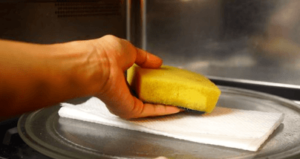
Dry sponges shouldn’t be placed in the microwave since they could catch fire, and you should also avoid using any cleaning sponges containing metallic fibers. To avoid burning your hand, wait until the sponge has cooled down after cooking the germs in the microwave.
How Often Should You Throw Away Kitchen Sponge?
It is a great and useful idea to replace your kitchen sponge every 2-3 weeks. A good way to remember is to clean it with bleach once a week. You can extend the life of your sponge by rinsing it well and squeezing out excess water after each use.
Why Does Dawn Dish Soap Make My Sponge Stink
You’re not alone if you’ve ever discovered that your sponge smells strange and nasty after using Dawn dish soap. It turns out that this occurrence has a scientific explanation. Dawn dish soap is made with an ingredient called cocamidopropyl betaine, which is a common surfactant and emulsifier.
This component may decompose into amine-like compounds when it comes into touch with water. Amine molecules are known to produce a foul odor when they interact with certain bacteria. So what does your smelling kitchen sponge mean?
Well, it’s likely that the Dawn dish soap is causing bacteria to grow on your sponge, which in turn is leading to the bad smell. The good news is that you can get rid of the smell by simply washing your sponge with hot water and vinegar. So next time your sponge smells funky after using Dawn, don’t panic – just give it a good cleaning and it should be back to normal in no time!
Conclusion: (How to keep kitchen sponges from smelling)
If your kitchen sponge smells bad, there are a few things you can do to clean it and prevent the odor from coming back. Soak your kitchen sponge in vinegar for a few minutes, then rinse it completely. You can also try boiling the sponge for a few minutes to kill any bacteria that may be causing the smell.
If those methods don’t work, you may need to replace your sponge.




Comments(0)